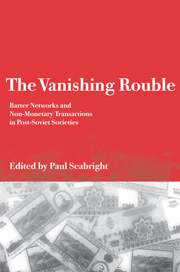Book contents
- Frontmatter
- Contents
- List of figures
- List of tables
- List of boxes
- Preface
- List of contributors
- Introduction: barter networks and ‘information islands’
- I Theory
- II Large-scale empirical studies
- 4 Barter in post-Soviet societies: what does it look like and why does it matter?
- 5 The growth of non-monetary transactions in Russia: causes and effects
- 6 Barter in Russia
- 7 The household in a non-monetary market economy
- 8 Barter in transition economies: competing explanations confront Ukrainian data
- 9 Barter and non-monetary transactions in transition economies: evidence from a cross-country survey
- III Ethnography
- Conclusion: what is to be done?
- Index
9 - Barter and non-monetary transactions in transition economies: evidence from a cross-country survey
Published online by Cambridge University Press: 05 May 2010
- Frontmatter
- Contents
- List of figures
- List of tables
- List of boxes
- Preface
- List of contributors
- Introduction: barter networks and ‘information islands’
- I Theory
- II Large-scale empirical studies
- 4 Barter in post-Soviet societies: what does it look like and why does it matter?
- 5 The growth of non-monetary transactions in Russia: causes and effects
- 6 Barter in Russia
- 7 The household in a non-monetary market economy
- 8 Barter in transition economies: competing explanations confront Ukrainian data
- 9 Barter and non-monetary transactions in transition economies: evidence from a cross-country survey
- III Ethnography
- Conclusion: what is to be done?
- Index
Summary
Introduction
The persistence of barter transactions over a number of years in complex industrialised economies has been one of the most puzzling paradoxes of the transition from central planning to market organisation. Historically barter has characterised relatively simple societies with a comparatively undiÿerentiated division of labour. It has also been observed in more complex societies in the aftermath of serious crises such as wars. For example, complex chains of bilateral exchanges of goods between firms and payment in kind to workers were prevalent in the western zones of post-war Germany between 1945 and mid-1948. In the context of a high level of uncertainty about the future of the economy, with the collapse of the Nazi command economy, the freezing of prices and wages at their 1936 levels and extensive controls over inter-regional trade, there was an extreme shortage of goods. An assessment at the time captured the essential role of barter in this episode: ‘Where neither trading for money nor redistribution of goods by political authority, alone or in combination, can ensure a reliable division of labour, bilateral exchange seems to be the safest line of economic retreat’ (Mendershausen, 1949, pp. 657–8). The improved functioning of the costly and cumbersome barter mechanism enabled production to recover from less than 20 per cent of the 1936 level in mid-1945 to 50 per cent by the end of 1947. In post-war Germany output recovery in a barter-dominated economy before the currency reform was often seen as remarkable (Abelshauser, 1975).
- Type
- Chapter
- Information
- The Vanishing RoubleBarter Networks and Non-Monetary Transactions in Post-Soviet Societies, pp. 236 - 256Publisher: Cambridge University PressPrint publication year: 2000
- 12
- Cited by



